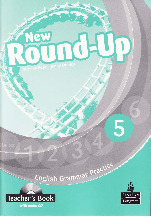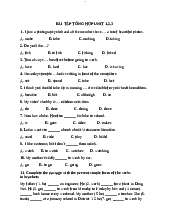






Preview text:
ĐỀ CƯƠNG ÔN TẬP TIẾNG ANH CHUYÊN NGÀNH CẤU TRÚC ĐỀ THI Gồm 2 phần:
General information about primary education: 5p Making lesson plan: 5p
A. GENERAL INFORMATION ABOUT PRIMARY EDUCATION
1. Short essay (7 sentences)
✔ What do you have to do to become a good primary school teacher?
To become a good primary school teacher, there are several essential things that one
should keep in mind. First, aspiring teachers should complete their degree in education or
a related field and ensure that they hold a valid teaching license. This will provide them
with the foundational knowledge and learning techniques they need to deliver an enriching
educational experience to their students. Second, having a good understanding of the
subjects that one will teach is vital. As a primary school teacher, we must elaborate on
complex subjects in a simplified manner that students can easily understand. Finally,
teachers should consistently seek professional development and workshops, as well as
opportunities to collaborate with other teachers. This continued learning leads to better
teaching and innovative education ideas that help students achieve and prepare for future
success. In conclusion, becoming a good primary school teacher demands attention and effort in various areas.
✔ What qualities does a good primary school teacher have?
A good primary school teacher is an essential component of a child's academic and
emotional growth. One of the key qualities of a good primary school teacher is their
patience. Young children are energetic and curious, and they require patient guidance to
keep up with their enthusiasm. Another crucial quality of a good primary school teacher is
strong communication skills. Children at this age require clear and easy-to-understand
instructions to grasp even the simplest concepts. Teachers who communicate well are able
to break down complex ideas into simple, easily digestible pieces. In conclusion, a good
primary school teacher must possess qualities far beyond subject-matter expertise.
Teachers who exhibit these qualities help create students who are lifelong learners,
curious, and passionate about the world around them.
✔ What are the skills of a good primary school teacher?
A good primary school teacher must possess a range of skills to create an effective,
dynamic, and engaging learning experience for their students. Effective classroom
management is an essential skill that enables teachers to create a supportive and
encouraging environment where students feel safe and comfortable to learn. This skill is
especially vital at the primary school level, where students are often full of energy and
curiosity. Empathy is a vital skill. Good teachers must be able to understand the needs and
feelings of their students. They should work to create a supportive environment that
fosters good relationships between themselves and their students. In conclusion, a good
primary school teacher must have a unique set of skills beyond academic knowledge.
Teachers who possess these skills foster a positive, encouraging, and fulfilling learning
experience for their students at the primary school level.
✔ What is your aspiration as a primary school teacher?
Being a primary school teacher is one of the most rewarding and challenging professions.
As such, a primary school teacher's aspiration should go beyond just teaching subject
matter. My aspiration as a primary school teacher would be to shape the lives of my
students in a positive way. I would like to help them develop a strong foundation in
essential life skills such as critical thinking, empathy, communication, and problem-
solving. I aspire to create a supportive and inclusive learning environment where each
child feels valued and appreciated. Ultimately, my goal as a primary school teacher would
be to inspire my students to become lifelong learners, who are curious, creative, and
passionate about the world. I aspire to instill them with a love for learning that will carry
them through their academic journey and beyond.
✔ What inspires you to become a teacher?
Teaching is a noble profession that requires passion, dedication, and commitment. For
many people, the inspiration to become teachers comes from their own experience in the
classroom. They may have had a teacher who inspired and encouraged them to learn or
who helped them discover their passion for a particular subject. Personally, my inspiration
to become a teacher comes from a desire to make a positive change in the world. I want to
use teaching as a way to impart knowledge, inspire young minds, and shape futures. The
idea that a lasting impact can be made, that one can help make a better world and make a
genuine difference in the lives of the students, inspires me profoundly. In conclusion, for
me, the profession of teaching offers an opportunity to inspire individuals and be
positively impactful in their lives by sharing knowledge and acquiring meaningful
relationships that will eventually bring a positive change in society.
✔ Why do you choose to be a teacher?
Teaching is a noble profession that plays a crucial role in shaping the future of society.
The decision to become a teacher may come from a range of reasons and motivations, but
for me, the desire to make a positive impact on the lives of others was the driving force.
As a student, I have had my share of inspiring teachers who have opened my mind to
endless possibilities and helped me discover my potential. They have made me realize that
teaching is not just about imparting knowledge but also about guiding students on their
path of self-discovery and personal growth. I chose to be a teacher because I want to be a
part of that transformative process in the lives of students. I want to inspire them,
challenge them, and equip them with the necessary skills and knowledge to achieve their
goals. I also want to create a safe and supportive learning environment where every
student can thrive and achieve their full potential. In conclusion, my decision to become a
teacher is driven by my passion for education and my desire to make a positive impact on the lives of others.
✔ What is your future plan as a teacher?
As a teacher, my future plan is to continually develop my skills and knowledge to better
serve my students and provide them with the best possible education. I believe that
personal and professional growth is essential for any teacher, and I plan to continue my
education in order to stay up-to-date with the latest teaching practices and techniques. One
of my goals is to create a learning environment that is interactive and engaging, where
students feel motivated and inspired to learn. I plan to incorporate technology into my
teaching to provide my students with a more immersive and interactive experience. This
will include using tools such as virtual reality and augmented reality to bring lessons to
life and make learning more fun and hands-on. In addition, I plan to provide my students
with opportunities to connect with the world beyond the classroom. In short, my future
plan as a teacher is to continue to grow and develop both personally and professionally. I
believe that by pursuing these goals, I can help my students achieve academic success,
personal growth, and a love of learning that will continue long after they leave my classroom.
2. Translate into Vietnamese Examples:
✔ The major goals of primary education are achieving basic literacy and numeracy amongst
all pupils, as well as establishing foundations in science, geography, history and other social sciences.
Mục tiêu chính của giáo dục tiểu học đó chính là giúp cho học sinh đạt được khả năng đọc
viết và tính toán cơ bản, cũng như thiết lập nền tảng về khoa học, địa lý, lịch sử và các
môn khoa học xã hội khác.
✔ Good teachers form strong relationships with their students and show that they care about
them as people. Good teachers are warm, accessible, enthusiastic and caring. Teachers
with these qualities are known to stay after school and make themselves available to
students and parents who need them.
Giáo viên giỏi phải tạo dựng được mối quan hệ bền chặt với học sinh và thể hiện được
rằng mình quan tâm tới các em như bao người. Giáo viên giỏi là những người ấm áp, dễ
tiếp cận, nhiệt huyết và chu đáo. Giáo viên với những phẩm chất này thường là những
người ở lại sau giờ học và luôn sẵn sàng giúp đỡ các em học sinh cũng như phụ huynh cần tới họ. 3. Fill in the blanks Example:
These schools can also organize classes to foster students’ studying capacity or build up optional education programs. maintains teach build up equipped meeting foster Reduced need
4. Rearrange the words to make sentence Example:
practitioner / In / countries, / it / possible / accredited / for / person / receive / by /
training / a / a / teacher / to / working / in/ the/ a / school / some / under / responsibility / as / of / is / experienced / an
In some countries, it is possible for a person working as an experienced practitioner in a
school under the responsibility of a teacher to receive accredited by training.
5. Put the verbs in brackets in the correct form Example:
A teacher (also (call) called a school teacher or, in some contexts, an educator) (be) is a
person who (help) helps students to acquire knowledge, competence or virtue. Informally the role
of teacher may be taken on by anyone.
6. Read the following passage and mark the letter A, B, C or D to indicate the correct
word for each of the blanks Example:
Skill in expression is not enough (1)______ itself. You must have something to say in the
first place. The effectiveness of your job depends (2)______ your ability to make other people
understand your work as they do on the quality of the work itself. 1: A. in B. on C. for D. by 2: A. much on B. most on C. on most D. on much 7. Answer the questions ✔
1 What subjects can be taught in primary school in Vietnam?
The subjects that can be taught in primary school in Vietnam include Vietnamese language,
mathematics, moral education, natural sciences, social sciences, physical education, arts, and
foreign languages (usually English). ✔
2 What are the major aims of primary education?
The major aims of primary education include developing basic knowledge, skills, and attitudes,
fostering moral and ethical values, promoting physical and mental health, and preparing students
for further education and lifelong learning. ✔
3 What are the roles of a primary school teacher?
The roles of a primary school teacher include planning and delivering lessons, assessing and
evaluating student performance, providing feedback and guidance, creating a positive and safe
learning environment, collaborating with colleagues and parents, and engaging in professional development. ✔
4 What is the role of a primary school teacher?
The role of a primary school teacher is to facilitate student learning and development by creating
engaging and effective learning experiences and providing support and guidance to students. ✔
5 What are the duties of a teacher?
The duties of a teacher include preparing lesson plans and teaching materials, delivering lessons,
assessing student learning, providing feedback and support to students, communicating with
parents, collaborating with colleagues, and engaging in professional development. ✔
6 Why is primary education important?
Primary education is important because it provides a foundation for lifelong learning, helps
develop essential skills and knowledge, promotes personal and social development, and prepares
students for further education and future success. ✔
7 What skills do primary school teacher need?
Primary school teachers need a range of skills, including subject knowledge, pedagogical
knowledge, communication skills, classroom management skills, and interpersonal skills. ✔
8 What are the skills of a primary school teacher?
The skills of a primary school teacher include effective communication, organization, patience,
creativity, adaptability, and the ability to build positive relationships with students and parents. ✔
9 What are the main objectives of teaching?
The main objectives of teaching include imparting knowledge, developing critical thinking skills,
fostering creativity, promoting social and emotional development, and preparing students for
future education and career opportunities. ✔
10 Who is responsible for the national curriculum in Vietnam?
The Ministry of Education and Training is responsible for the national curriculum in Vietnam. ✔
11 What are the teaching materials?
Teaching materials can include textbooks, workbooks, handouts, visual aids, and technology such as computers and projectors. ✔
12 What stationery does a teacher need?
A teacher may need stationery such as pens, pencils, markers, paper, and notebooks. ✔
13 What are the modern methods of teaching?
Modern methods of teaching may include technology-based instruction, project-based learning,
collaborative learning, and differentiated instruction. ✔
14 What is the most important role of the teacher?
The most important role of the teacher is to facilitate student learning and growth by creating a
safe and supportive learning environment, providing engaging and effective instruction, and
building positive relationships with students and parents. ✔
15 Why is teaching methods important?
Teaching methods are important because they can significantly impact student learning outcomes
and engagement. Effective teaching methods can help students develop critical thinking skills,
improve their retention of information, and increase their motivation to learn. 8. True or False Examples:
✔ Education must support children with basic understandings of the natural, society and the human beings. T
✔ It is started in the Education Law that primary education is compulsory to every child aged
from 6 to 11, primary education last 5 years from Form 1 to Form 5. T
✔ A primary school teacher is usually responsible for a couple of dozen young children for many hours of every weekday. F 9. Unscramble Examples:
✔ MNAYSTEOUULL SIMULTANEOUSLY ✔ OUENVRAABLF UNFAVORABLE ✔ TTTCOONNSIIU CONSTITUTION ✔ CENTTHUSSIIA ENTHUSIASTIC B. LESSON PLAN
✔ The Story of a Mother by Hans Christian Andersen
✔ The Little Match-Seller by Hans Christian Andersen
✔ The Beggar by Ivan Turgenev ✔ Parts of the body ✔ Parts of a plant
✔ The process of plant reproduction ✔ Addition in the range of 3 ✔ One quarter ✔ Rectangle




